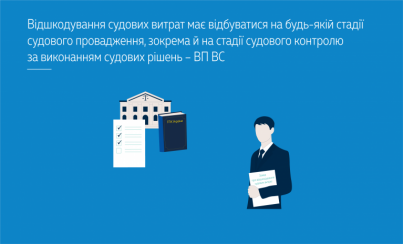Contact center of the Ukrainian Judiciary 044 207-35-46

In case of closure of the proceedings on the complaint or leaving the complaint without consideration at the stage of judicial control over the execution of court decisions, the state (private) enforcement officer as a subject whose actions can be appealed, on the basis of part 5 of Article 130 of the Commercial Procedural Code of Ukraine, may claim compensation for the costs incurred by him/her in connection with the case as a result of unreasonable actions of the person who appealed against his/her decisions, actions or inaction.
This conclusion was made by the Grand Chamber of the Supreme Court.
An LLC filed a lawsuit against a JSC to recover a debt, penalties, and inflationary charges. The courts partially satisfied the claim.
To enforce the decision, a private enforcement officer seized the debtor's funds. The latter filed a complaint, but the court dismissed the complaint.
Subsequently, the private enforcement officer filed an application for reimbursement of legal fees, which was partially granted by the courts of first and second instance.
The Grand Chamber of the Supreme Court upheld the debtor's cassation appeal and cancelled the decisions of the courts of previous instances, noting that reimbursement of court costs should take place at any stage of court proceedings, including at the stage of judicial control over the enforcement of court decisions.
Based on the analysis of Articles 339, 343, 344 of the Commercial Procedural Code of Ukraine, the SC Grand Chamber concluded that a private enforcement officer, as an entity whose actions may be subject to appeal, is entitled to reimbursement of court costs incurred by him/her during the relevant court proceedings on a general basis.
At the same time, the provisions of Article 343 of the Commercial Procedural Code of Ukraine do not cover all possible cases of procedural decisions that may result in the termination of proceedings based on a complaint by a party to the enforcement proceedings.
In the absence of a special rule regulating certain cases of termination of proceedings at the stage of judicial control over the enforcement of a court decision, courts should be guided by the general rules governing the distribution of court costs (Chapter 8 ‘Court Costs’ of the Commercial Procedural Code of Ukraine).
Pursuant to part 5 of Article 130 of the Commercial Procedural Code of Ukraine, in the event of the case being dismissed or left without consideration, the defendant has the right to claim compensation for the costs incurred by it in connection with the case as a result of unreasonable actions of the plaintiff.
The rule of this Article applies to all stages of the proceedings at which such costs may be incurred.
Thus, if the proceedings on the complaint are closed or the complaint is left without consideration at the stage of judicial control over the enforcement of court decisions, the state (private) enforcement officer may, pursuant to part 5 of Article 130 of the Commercial Procedural Code of Ukraine, claim compensation for the expenses incurred by him/her in connection with the proceedings, including legal aid, as a result of unreasonable actions of the person who appealed against his/her decisions, actions or inaction.
At the same time, it is a prerequisite to prove what unreasonable actions of the person who appealed against his decision, action or inaction were committed during the consideration of the case.
However, the private enforcement officer did not prove that the complainant's actions were unjustified, and therefore the SC Grand Chamber dismissed the application for an additional decision on reimbursement of court costs.
Resolution of the Grand Chamber of the Supreme Court of 18 December 2024 in case No. 921/357/20 (proceedings No. 12-48гс24) - https://reyestr.court.gov.ua/Review/123992368.
This and other legal opinions of the Supreme Court are available in the Database of Legal Positions of the Supreme Court - https://lpd.court.gov.ua.